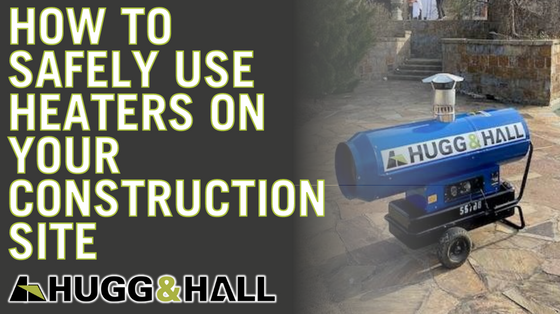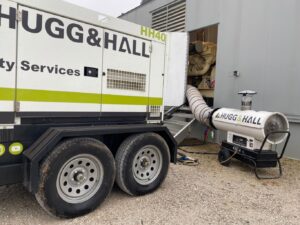
How to Safely Use Heaters on Your Construction Site
Winter weather is here to stay, and it can put a damper on your jobsite productivity. Heaters can be a great option to keep your project on track, but they aren’t without risks. Use these tips to keep your team safe and warm this winter.
Heater Safety

Tips to keep your team safe include, but aren’t limited to:
- Place heating unit on stable, noncombustible ground.
- Schedule regular inspections and preventative maintenance on heaters, hoses, and fuel tanks. Maintenance should be performed by a qualified service company.
- Secure fuel tanks and protect them from moving equipment. Post “No Smoking” signs in the storage area.
- Use American Gas Association (AGA) rated piping for gas-powered units. Never let equipment drive over flexible fuel lines.
- Keep flue stacks far away from combustible materials. Never direct flue stacks into a building.
- Ensure spaces are well-ventilated.
- Install carbon monoxide detectors in the area.
- Never leave heaters running unattended. If the heater has an LP gas supply, shut it off at the cylinder valve when you’re not using it.
- Always keep a fire extinguisher nearby. For more information about preventing fire risks, check out this fire safety article from Travelers.
Always follow the tips listed above for any heater. For machine-specific tips for direct-fired, indirect-fired, and electric heater safety, check the following sections.
Direct fired heaters (AKA “salamanders”) convert 100% of their fuel to heat and can’t be ducted. Salamanders have a fan that pushes air across an open flame.
Direct fire heaters are more effective and cheaper than indirect heaters, but they do have greater risks.
Tips to keep your team safe include, but aren’t limited to:
- Only use salamanders when there is plenty of ventilation. The open flame poses a carbon monoxide risk.
- Ensure electronic flame sensors or pilot safety valves are in place.
- Shut down and cool off the heater before refueling. Never refuel indoors or within 50 feet of the building.
Indirect fired heaters are usually fueled by propane or diesel. The flame is contained in a burn chamber, where cool air passes over and around a heat exchanger. The warm air is ducted into the building.

Indirect fired heaters have a lower potential to cause carbon monoxide poisoning, but they have a higher cost and lower efficiency during general use.
Tips to keep your team safe include, but aren’t limited to:
- Keep fumes away from work areas. Aim the flue stack away from any work areas, doors, open windows, or air intake areas.
- Protect fuel tanks by storing away from work areas and the heater itself. Place physical barriers around the fuel tanks.
- Conduct regular inspections for blockages and leaks.
Electric heaters are a great option when no open flame is permitted or carbon monoxide is a concern. They don’t require ventilation and provide combustion-free heat, making them useful once a project’s electrical work is completed.
Tips to keep your team safe include, but aren’t limited to:
- Use units only in a dry environment.
- Make sure the electrical circuit is rated for the size of the unit.
- Locate away from combustible materials.
Visit our website to learn more about the temporary heaters we offer. Contact us for a quote!
Want more winter weather tips and tricks? Check out our resources section!
Editor’s Note: This post was originally published in December 2022. We updated it for freshness, accuracy, and comprehensiveness in November 2023.
Back to News
Subscribe and unlock cutting-edge equipment insights, trends and tips!
Subscribe




